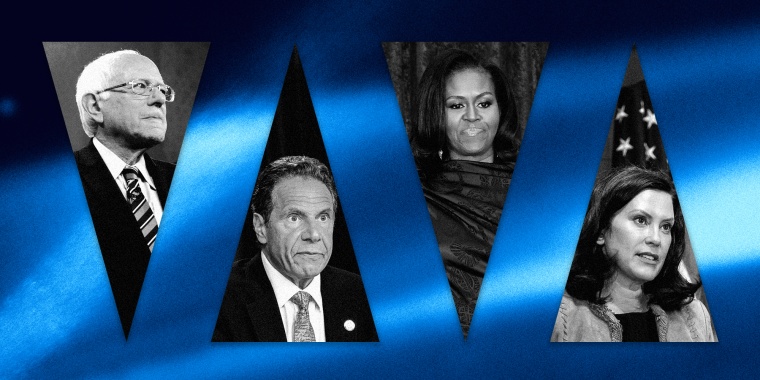WASHINGTON — No one has ever done this before.
Democrats will be guinea pigs in their own experiment Monday night as they kick off the first of four nights of an all-virtual Democratic National Convention.
Because of the coronavirus crisis, Democrats scrapped the podiums and packed arenas for two hours of programming each night that will look more like a TV special than a traditional convention. (In fact, the event is being produced by an executive producer of the Super Bowl halftime show and the Tony Awards.)
That means shorter speaking slots and fewer of them, more opportunity for alternative formats and backdrops — and also more ways for something to go wrong. Meanwhile, much remains a mystery about what President Donald Trump plans for his Republican National Convention, which starts next Monday.
The Democrats' convention will culminate Thursday when former Vice President Joe Biden accepts his party's nomination, but Monday night will feature some of the party's biggest stars and offer the first look at how this unprecedented event will work (or not).
Here are five things to watch:
1. Don't forget to mute
By now, everyone is used to the inevitable glitches that come with using Zoom and other video streaming services to stay in touch with loved ones — but calls with your family and friends are not broadcast to millions of Americans.
The convention will use both recorded video and professional crews to beam in live speeches from across the country, so it won't just be an endless stream of people staring at laptops in front of bookcases.
But the timing is tight and politicians can be long-winded. Monday's two hours alone need to fit in speeches by Vermont Sen. Bernie Sanders, Minnesota Sen. Amy Klobuchar, New York Gov. Andrew Cuomo, Michigan Gov. Gretchen Whitmer, South Carolina Rep. Jim Clyburn, former Ohio Gov. John Kasich (a Republican), Alabama Sen. Doug Jones, Nevada Sen. Catherine Cortez Masto and former first lady Michelle Obama, among several others.
Download the NBC News app for alerts and all the latest on the Democratic convention
So some glitches seem inevitable. (Remember the sound of the toilet flushing during the Supreme Court's oral arguments?) The question is how big and distracting any technical issues will be and how speakers and organizers respond to them.
2. Bernie Sanders speaks
The last time Sanders appeared at a Democratic National Convention, hundreds of his delegates walked out in protest of his loss to Hillary Clinton in 2016, and what they felt was the unfair treatment by the national party.
This year, his delegates can't stage a walkout since there is nowhere to walk out of, but his movement is also far more integrated into the Democratic Party than it was four years ago. The vast majority of Sanders-aligned activists have fallen in line behind Biden, thanks to both the intensity they feel about removing Trump from office and years of outreach.
Tensions remain, however, and some progressives have been disappointed by the schedule for the convention, which will give New York Rep. Alexandria Ocasio-Cortez just one minute to speak Tuesday while offering time to moderates and former Republicans, like the billionaire Mike Bloomberg.
Will Sanders use his speech to make a direct appeal to Biden-skeptical fans? Will he use the platform to push Biden to support issues like "Medicare for All"? Will he focus on how much the party has adopted his ideas, or the work he feels there is still left to do?
3. The COVID-crisis governors
Governors typically get less attention than Washington politicos, but they've been front-and-center in the response to the coronavirus and Democrats want to highlight their leadership in contrast to that of the Trump administration.
Cuomo's daily briefings in the early weeks of the COVID-19 pandemic became must-watch viewing for many liberals and his star rose as New York reopened successfully and practically ran the virus out of town with a current infection rate of below 1 percent.
Whitmer, who won the key battleground state of Michigan last year with a campaign centered around a promise to "fix the damn roads," has clashed with Trump — who dismissed her as "that woman from Michigan." She remains popular back home and ended up as a finalist to be Biden's running mate.
4. Michelle Obama
Almost four years since leaving as the first lady, Michelle Obama remains one of the most popular political figures in the United States and around the world.
Obama has mostly stayed above the fray of politics, despite the wishes of many Democrats who want to see her run for office, but her occasional forays into politics have been memorable. Her 2018 book was one of the best-selling memoirs in history, securing her a post-White House place in the culture.
This year, Obama is expected to draw more viewers than almost any other speaker, rivaled only by the acceptance speeches of Biden and Kamala Harris and the address by her husband, former President Barack Obama, on Wednesday.
5. John Kasich, Republican
This is not the convention John Kasich wanted to address.
In 2016, the then-Ohio governor wanted to be accepting his party's presidential nomination at the Republican convention, but he lost the GOP primary to Trump and instead became one of the founding members of the so-called Never Trump Republicans who have broken with the party.
Hosting cast-outs from the rival party is a classic tradition of conventions, and Kasich's inclusion Monday is an attempt by the Biden campaign to make Trump-skeptical Republicans and independents feel more comfortable voting for a Democrat. The inclusion of a Republican, though, has rankled some progressives, who argue his precious speaking time should go to rising stars on the left instead of trying to chase a sliver of voters who may break party ranks.

